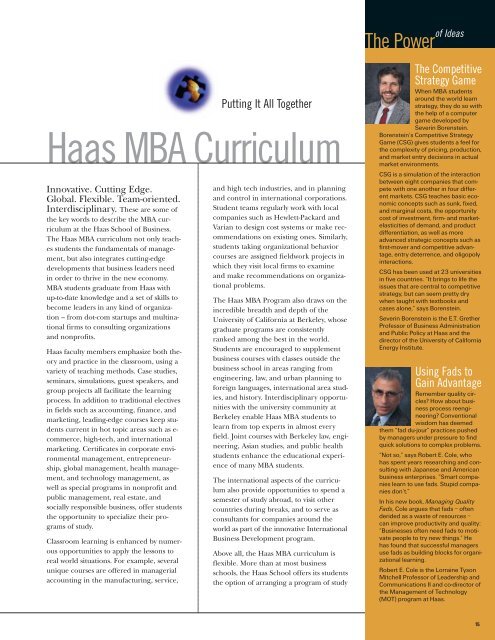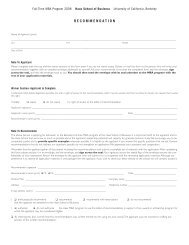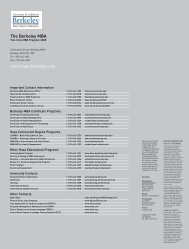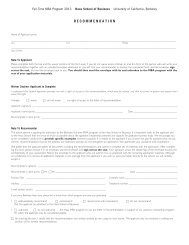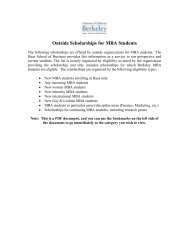TheBerkeleyMBA - Full-time MBA Program, Haas School of ...
TheBerkeleyMBA - Full-time MBA Program, Haas School of ...
TheBerkeleyMBA - Full-time MBA Program, Haas School of ...
Create successful ePaper yourself
Turn your PDF publications into a flip-book with our unique Google optimized e-Paper software.
<strong>of</strong> Ideas<br />
The Power<br />
<strong>Haas</strong> <strong>MBA</strong> Curriculum<br />
Innovative. Cutting Edge.<br />
Global. Flexible. Team-oriented.<br />
Interdisciplinary. These are some <strong>of</strong><br />
the key words to describe the <strong>MBA</strong> curriculum<br />
at the <strong>Haas</strong> <strong>School</strong> <strong>of</strong> Business.<br />
The <strong>Haas</strong> <strong>MBA</strong> curriculum not only teaches<br />
students the fundamentals <strong>of</strong> management,<br />
but also integrates cutting-edge<br />
developments that business leaders need<br />
in order to thrive in the new economy.<br />
<strong>MBA</strong> students graduate from <strong>Haas</strong> with<br />
up-to-date knowledge and a set <strong>of</strong> skills to<br />
become leaders in any kind <strong>of</strong> organization<br />
– from dot-com startups and multinational<br />
firms to consulting organizations<br />
and nonpr<strong>of</strong>its.<br />
<strong>Haas</strong> faculty members emphasize both theory<br />
and practice in the classroom, using a<br />
variety <strong>of</strong> teaching methods. Case studies,<br />
seminars, simulations, guest speakers, and<br />
group projects all facilitate the learning<br />
process. In addition to traditional electives<br />
in fields such as accounting, finance, and<br />
marketing, leading-edge courses keep students<br />
current in hot topic areas such as e-<br />
commerce, high-tech, and international<br />
marketing. Certificates in corporate environmental<br />
management, entrepreneurship,<br />
global management, health management,<br />
and technology management, as<br />
well as special programs in nonpr<strong>of</strong>it and<br />
public management, real estate, and<br />
socially responsible business, <strong>of</strong>fer students<br />
the opportunity to specialize their programs<br />
<strong>of</strong> study.<br />
Classroom learning is enhanced by numerous<br />
opportunities to apply the lessons to<br />
real world situations. For example, several<br />
unique courses are <strong>of</strong>fered in managerial<br />
accounting in the manufacturing, service,<br />
Putting It All Together<br />
and high tech industries, and in planning<br />
and control in international corporations.<br />
Student teams regularly work with local<br />
companies such as Hewlett-Packard and<br />
Varian to design cost systems or make recommendations<br />
on existing ones. Similarly,<br />
students taking organizational behavior<br />
courses are assigned fieldwork projects in<br />
which they visit local firms to examine<br />
and make recommendations on organizational<br />
problems.<br />
The <strong>Haas</strong> <strong>MBA</strong> <strong>Program</strong> also draws on the<br />
incredible breadth and depth <strong>of</strong> the<br />
University <strong>of</strong> California at Berkeley, whose<br />
graduate programs are consistently<br />
ranked among the best in the world.<br />
Students are encouraged to supplement<br />
business courses with classes outside the<br />
business school in areas ranging from<br />
engineering, law, and urban planning to<br />
foreign languages, international area studies,<br />
and history. Interdisciplinary opportunities<br />
with the university community at<br />
Berkeley enable <strong>Haas</strong> <strong>MBA</strong> students to<br />
learn from top experts in almost every<br />
field. Joint courses with Berkeley law, engineering,<br />
Asian studies, and public health<br />
students enhance the educational experience<br />
<strong>of</strong> many <strong>MBA</strong> students.<br />
The international aspects <strong>of</strong> the curriculum<br />
also provide opportunities to spend a<br />
semester <strong>of</strong> study abroad, to visit other<br />
countries during breaks, and to serve as<br />
consultants for companies around the<br />
world as part <strong>of</strong> the innovative International<br />
Business Development program.<br />
Above all, the <strong>Haas</strong> <strong>MBA</strong> curriculum is<br />
flexible. More than at most business<br />
schools, the <strong>Haas</strong> <strong>School</strong> <strong>of</strong>fers its students<br />
the option <strong>of</strong> arranging a program <strong>of</strong> study<br />
The Competitive<br />
Strategy Game<br />
When <strong>MBA</strong> students<br />
around the world learn<br />
strategy, they do so with<br />
the help <strong>of</strong> a computer<br />
game developed by<br />
Severin Borenstein.<br />
Borenstein’s Competitive Strategy<br />
Game (CSG) gives students a feel for<br />
the complexity <strong>of</strong> pricing, production,<br />
and market entry decisions in actual<br />
market environments.<br />
CSG is a simulation <strong>of</strong> the interaction<br />
between eight companies that compete<br />
with one another in four different<br />
markets. CSG teaches basic economic<br />
concepts such as sunk, fixed,<br />
and marginal costs, the opportunity<br />
cost <strong>of</strong> investment, firm- and marketelasticities<br />
<strong>of</strong> demand, and product<br />
differentiation, as well as more<br />
advanced strategic concepts such as<br />
first-mover and competitive advantage,<br />
entry deterrence, and oligopoly<br />
interactions.<br />
CSG has been used at 23 universities<br />
in five countries. “It brings to life the<br />
issues that are central to competitive<br />
strategy, but can seem pretty dry<br />
when taught with textbooks and<br />
cases alone,” says Borenstein.<br />
Severin Borenstein is the E.T. Grether<br />
Pr<strong>of</strong>essor <strong>of</strong> Business Administration<br />
and Public Policy at <strong>Haas</strong> and the<br />
director <strong>of</strong> the University <strong>of</strong> California<br />
Energy Institute.<br />
Using Fads to<br />
Gain Advantage<br />
Remember quality circles?<br />
How about business<br />
process reengineering?<br />
Conventional<br />
wisdom has deemed<br />
them “fad du-jour” practices pushed<br />
by managers under pressure to find<br />
quick solutions to complex problems.<br />
“Not so,” says Robert E. Cole, who<br />
has spent years researching and consulting<br />
with Japanese and American<br />
business enterprises. “Smart companies<br />
learn to use fads. Stupid companies<br />
don’t.”<br />
In his new book, Managing Quality<br />
Fads, Cole argues that fads – <strong>of</strong>ten<br />
derided as a waste <strong>of</strong> resources –<br />
can improve productivity and quality:<br />
“Businesses <strong>of</strong>ten need fads to motivate<br />
people to try new things.” He<br />
has found that successful managers<br />
use fads as building blocks for organizational<br />
learning.<br />
Robert E. Cole is the Lorraine Tyson<br />
Mitchell Pr<strong>of</strong>essor <strong>of</strong> Leadership and<br />
Communications II and co-director <strong>of</strong><br />
the Management <strong>of</strong> Technology<br />
(MOT) program at <strong>Haas</strong>.<br />
15


